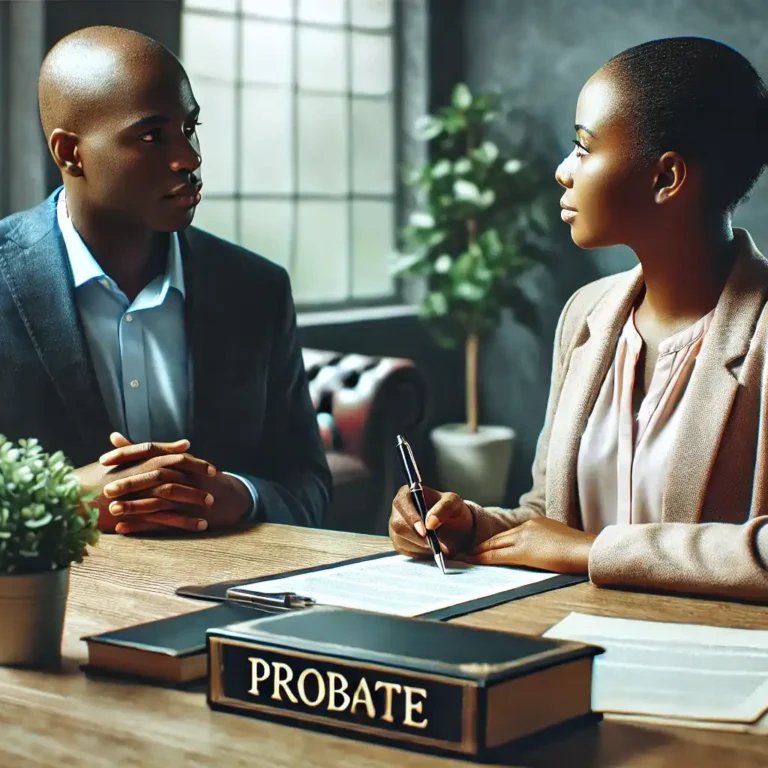What is Probate? Understanding the Process of Estate Settlement

Probate is the legal process of settling a deceased person’s estate by managing their assets, paying debts, and distributing the remaining property to beneficiaries. When someone passes away, probate ensures that their estate is properly administered and that all legal and financial obligations are met. It is a court-supervised process, ensuring that assets are distributed properly, debts are paid, and legal matters are handled. The need for probate depends on the value of the estate, type of assets, and whether there is a will.
Example:
If someone passes away owning a house solely in their name and leaves no instructions for its transfer, the estate would likely go through probate to legally transfer ownership to heirs.
Steps in Probate:
- Filing the Petition: The executor files a petition to begin probate.
- Validating the Will: The court verifies the authenticity of the will.
- Notifying Beneficiaries and Creditors: The executor informs beneficiaries and creditors about the probate process.
- Inventory and Appraisal: The executor gathers and assesses all assets of the deceased.
- Settling Debts: Any outstanding debts, including taxes, are paid from the estate’s assets.
- Distributing Assets: Once debts are paid, the remaining assets are distributed to beneficiaries.
- Closing the Estate: The probate process concludes once the court approves the distribution and final accounting.
Types of Probate:
- Formal Probate: Required when the estate is large, complicated, or contested.
- Informal Probate: Used when the estate is straightforward, uncontested, and the will is clear.
- Small Estate Exemptions: Some small estates may bypass formal probate depending on the state’s threshold for “small estates.”
Case and Point: Examples of When Probate is Used
- No Will Exists (Intestate): If a person dies without a will, probate is used to determine how their assets are distributed according to state law. For example, if a man dies without a will, leaving behind a bank account and home, probate will decide how these assets are distributed to his heirs, such as his spouse or children.
- Sole Ownership of Property: If a woman owned a car and a home solely in her name and did not specify how these should be transferred, probate is required to legally transfer ownership to her beneficiaries, even if she has a will.
- Complex Estates: When someone leaves behind a large estate with multiple assets, including real estate, businesses, and investments, probate is necessary to manage the distribution of assets, ensuring creditors are paid, and beneficiaries receive their inheritances according to the will. An example could involve a person with multiple properties and stock portfolios, where the probate court oversees the legal transfer to heirs.
- Disputed Wills: If beneficiaries contest the validity of a will, probate provides a legal forum to resolve disputes. For instance, if one sibling claims the will was altered under duress, probate allows the court to verify the authenticity and ensure the correct legal process is followed for distribution.
| When Probate is Used | Reason for Probate |
|---|---|
| No Will | To distribute assets according to state law. |
| Sole Ownership of Property | To legally transfer ownership of assets owned solely by the deceased. |
| Complex Estates | To ensure that all legal requirements, including payment of debts, are met. |
| Disputed Wills | To resolve disputes among heirs or beneficiaries. |
Reference Table of Probate Steps
| Probate Process | Details |
|---|---|
| Filing Petition | Executor files a petition with the court to begin probate. |
| Validating the Will | The court authenticates the will and appoints an executor. |
| Notifying Beneficiaries | Heirs and creditors are formally notified of probate. |
| Inventory of Estate | Executor compiles a detailed list of assets and their values. |
| Paying Debts and Taxes | The estate’s assets are used to pay off any remaining debts and taxes. |
| Distributing Assets | After debts are settled, the remaining property is distributed according to the will or state law (if no will exists). |
| Closing the Estate | The court approves the final distribution and closes the estate. |
How LegalDocExpert.com Can Help:
LegalDocExpert.com provides expert probate services to guide executors through the process. From preparing and filing necessary documents to managing the distribution of assets, they ensure probate proceeds smoothly and efficiently. Whether you are handling a large estate or seeking a simplified process, LegalDocExpert.com helps streamline the probate process, saving you time and reducing legal costs.






